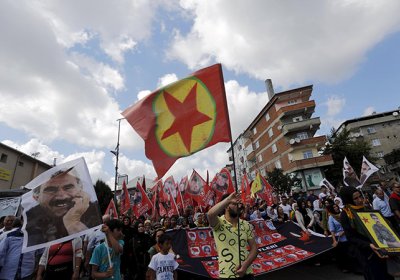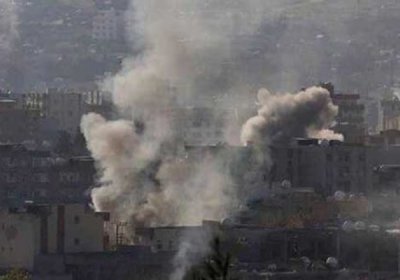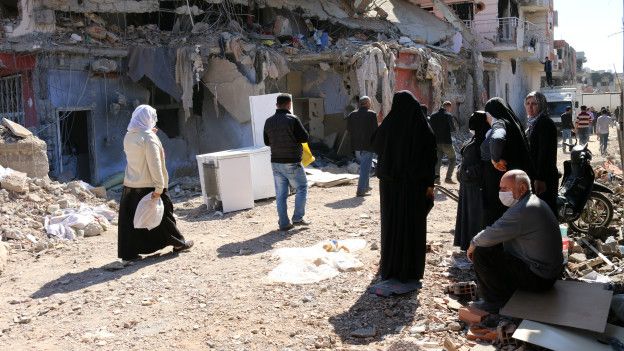 Cizre, March 2. Photo: Hatice Kamer/BBC.
The following report for BBC Turkish by Hatice Kamer in Cizre was translated for Green Left Weekly by I Zekeriya Ayman.
Cizre, March 2. Photo: Hatice Kamer/BBC.
The following report for BBC Turkish by Hatice Kamer in Cizre was translated for Green Left Weekly by I Zekeriya Ayman.
Turkey
 Cizre, March 2. Photo: Hatice Kamer/BBC.
The following report for BBC Turkish by Hatice Kamer in Cizre was translated for Green Left Weekly by I Zekeriya Ayman.
Cizre, March 2. Photo: Hatice Kamer/BBC.
The following report for BBC Turkish by Hatice Kamer in Cizre was translated for Green Left Weekly by I Zekeriya Ayman.
 Protestors knock down police barricade in Amed, March 2. Photo: Kurdish Question.
Thousands of people marched to the Sur district of Kurdish city of Amed (Diyarbakir in Turkish) in Turkey's south-east Sur district from all corners of the city on March 2 to break the three-month siege and curfew by Turkish state forces.
Protestors knock down police barricade in Amed, March 2. Photo: Kurdish Question.
Thousands of people marched to the Sur district of Kurdish city of Amed (Diyarbakir in Turkish) in Turkey's south-east Sur district from all corners of the city on March 2 to break the three-month siege and curfew by Turkish state forces.
 Kurşunlu mosque in Amed. Damage is from bombardment by the Turkish military.
The following statement was released by Peoples' Democratic Party (HDP) co-chairs Figen Yüksekdağ and Selahattin Demirtaş on March 1.
Kurşunlu mosque in Amed. Damage is from bombardment by the Turkish military.
The following statement was released by Peoples' Democratic Party (HDP) co-chairs Figen Yüksekdağ and Selahattin Demirtaş on March 1.
* * *
Across 58 separate curfews imposed in several neighbourhoods of the 21 districts of 7 Kurdish provinces, 290 citizens have so far lost their lives.Since the Mu'l'livaaykkaal killings of 2009, the Tamil diaspora has mostly focused political efforts towards demanding justice for the inhuman crimes committed against Tamil civilians.
While such efforts have elevated international awareness of the gross human rights violations committed by the Sri Lankan military during the war, the approach has not yielded results on prosecuting the perpetrators of the international crimes.
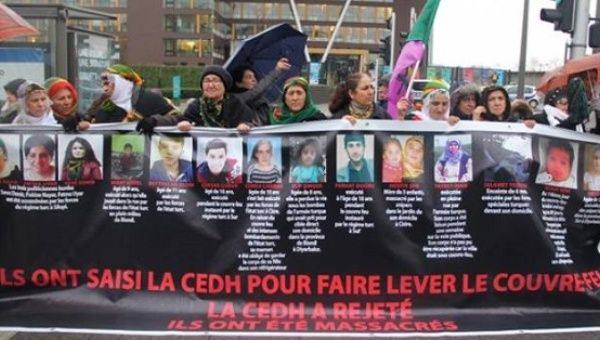 Kurdish women staged a sit-in in Strasbourg against the silence of European institutions over Turkey's crime
A coalition of pro-Kurdish European groups held a five day sit-in in front of European institutions in Strasbourg in eastern France, starting on February 23, to protest Europe's silence on the Turkish government's ongoing massacre of Kurds. The action targeted the European Court of Human Rights.
Kurdish women staged a sit-in in Strasbourg against the silence of European institutions over Turkey's crime
A coalition of pro-Kurdish European groups held a five day sit-in in front of European institutions in Strasbourg in eastern France, starting on February 23, to protest Europe's silence on the Turkish government's ongoing massacre of Kurds. The action targeted the European Court of Human Rights.
İlham Ehmed is Co-President of the Syrian Democratic Council, the political body with which the Syrian Democratic Forces (QSD) are affiliated, and a leading representative of the Kurdish-led Rojava Revolution in Northern Syria.
She spoke to Firat News Agency on February 22 about the QSD's recent gains and Turkey's bombardment, and threatened invasion, of Rojava.
* * *
What is your evaluation of Turkey's recent escalated attacks on Rojava?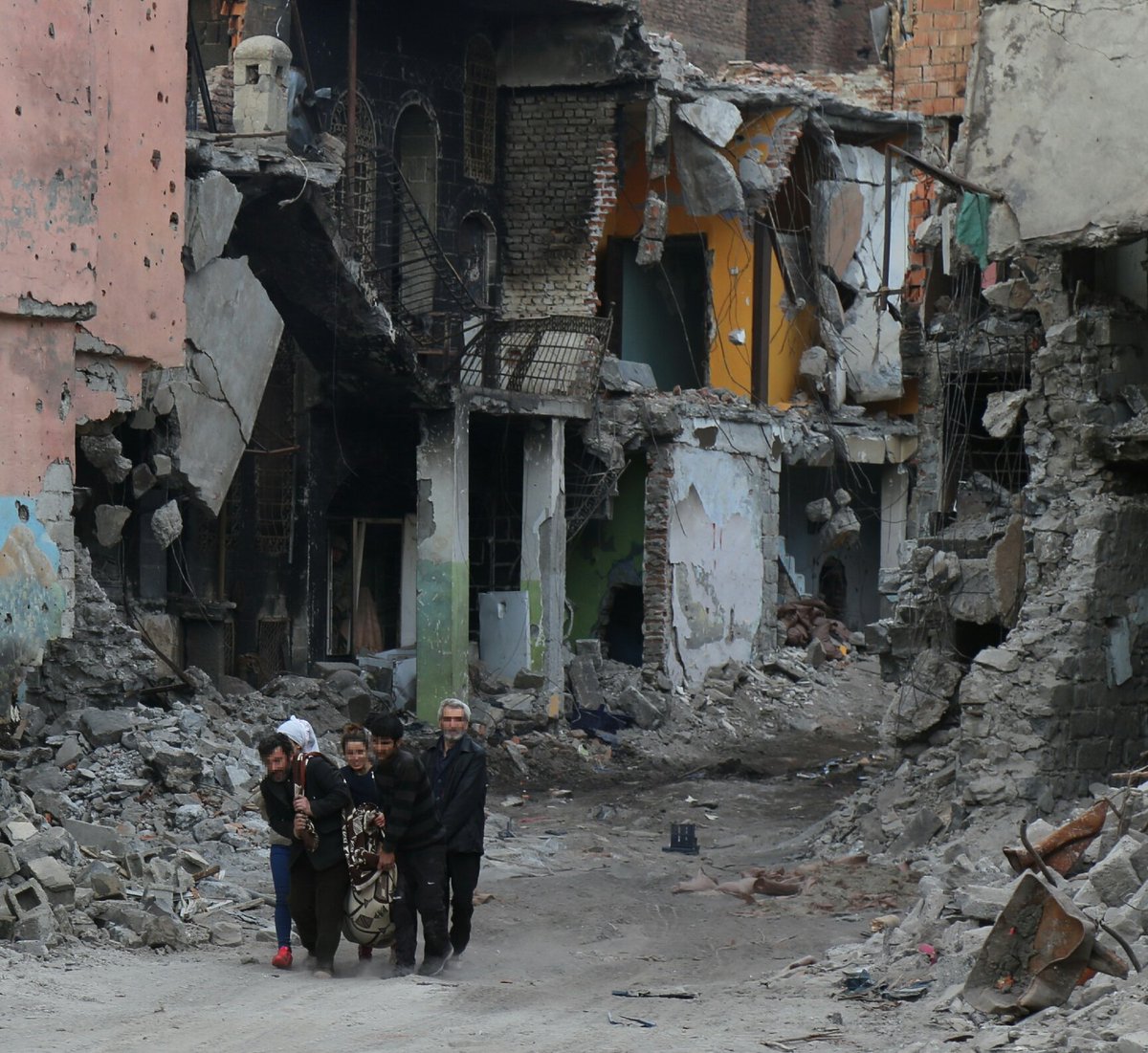 Destruction caused by Turkish military in Diyarbakır (Amed), Turkish Kurdistan (Bakur), February 20.
Australians for Kurdistan (AfK) is circulating an open letter urging Australian academics to support their colleagues in Turkey, who are facing massive repression by the government for denouncing the war on the Kurds.
Destruction caused by Turkish military in Diyarbakır (Amed), Turkish Kurdistan (Bakur), February 20.
Australians for Kurdistan (AfK) is circulating an open letter urging Australian academics to support their colleagues in Turkey, who are facing massive repression by the government for denouncing the war on the Kurds.
Russian Prime Minister Dmitri Medvedev said in an interview with German newspaper Handelsblatt on February 11 that a threatened ground invasion of Syria by Western allies Turkey and possibly Saudi Arabia would lead to a “new world war”. On February 18, Hawar News Agency reported that “dozens” of Turkish armoured vehicles had advanced 200 metres across the Syrian border.
More than 100 Members of the European Parliament (MEPs) have launched a petition campaign for the removal of the Kurdistan Workers' Party from the EU list of terrorist groups, An Phoblacht said on February 18.
The PKK began an armed campaign for Kurdish liberation against the Turkish state in 1984, although it had been in a peace process until the Turkish government unilaterally ended talks and restarted the conflict last year.
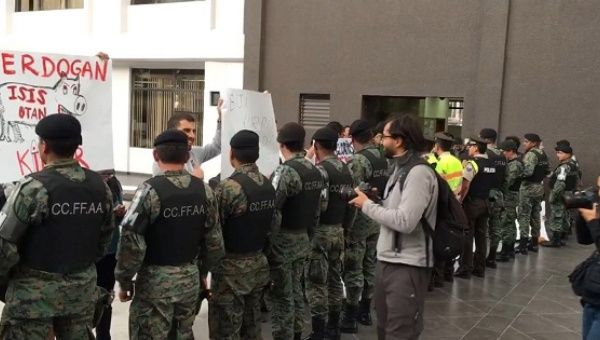 Protest against Turkish President Recep Tayyip Erdoğan in Quito, Ecuador on February 4, 2016. Photo: Giran Özcan.
Supporters of the Kurdish struggle took to the streets of Ecuador's capital, Quito, on February 4 to protest against Turkey's President Recep Tayyip Erdoğan, who is in Ecuador on an official two-day visit. At the protest, one Erdoğan's bodyguards broke the nose of Ecuadorean member of parliament Diego Vintimilla.
Protest against Turkish President Recep Tayyip Erdoğan in Quito, Ecuador on February 4, 2016. Photo: Giran Özcan.
Supporters of the Kurdish struggle took to the streets of Ecuador's capital, Quito, on February 4 to protest against Turkey's President Recep Tayyip Erdoğan, who is in Ecuador on an official two-day visit. At the protest, one Erdoğan's bodyguards broke the nose of Ecuadorean member of parliament Diego Vintimilla.
 Police officers from the Diyarbakir Anti-Terror Department in south-eastern Turkey raided the facilities of football club Amedspor after its 2-1 cup win at Bursapo on January 31. The win put the club, with a strong following among Turkey's persecuted Kurdish minority, into the last eight of the Turkish League Cup.
Police officers from the Diyarbakir Anti-Terror Department in south-eastern Turkey raided the facilities of football club Amedspor after its 2-1 cup win at Bursapo on January 31. The win put the club, with a strong following among Turkey's persecuted Kurdish minority, into the last eight of the Turkish League Cup.
Turkey is rapidly descending into civil war as the government of President Recep Tayyip Erdoğan deepens its offensive against the Kurdish population, left-wing opposition parties, journalists and academics.
The Turkish government says it is fighting the armed forces of the left-wing Kurdistan Workers Party (PKK), with which the government terminated peace talks last year. But the brunt of the state's violence has been directed against civilians.
- Previous page
- Page 16
- Next page



